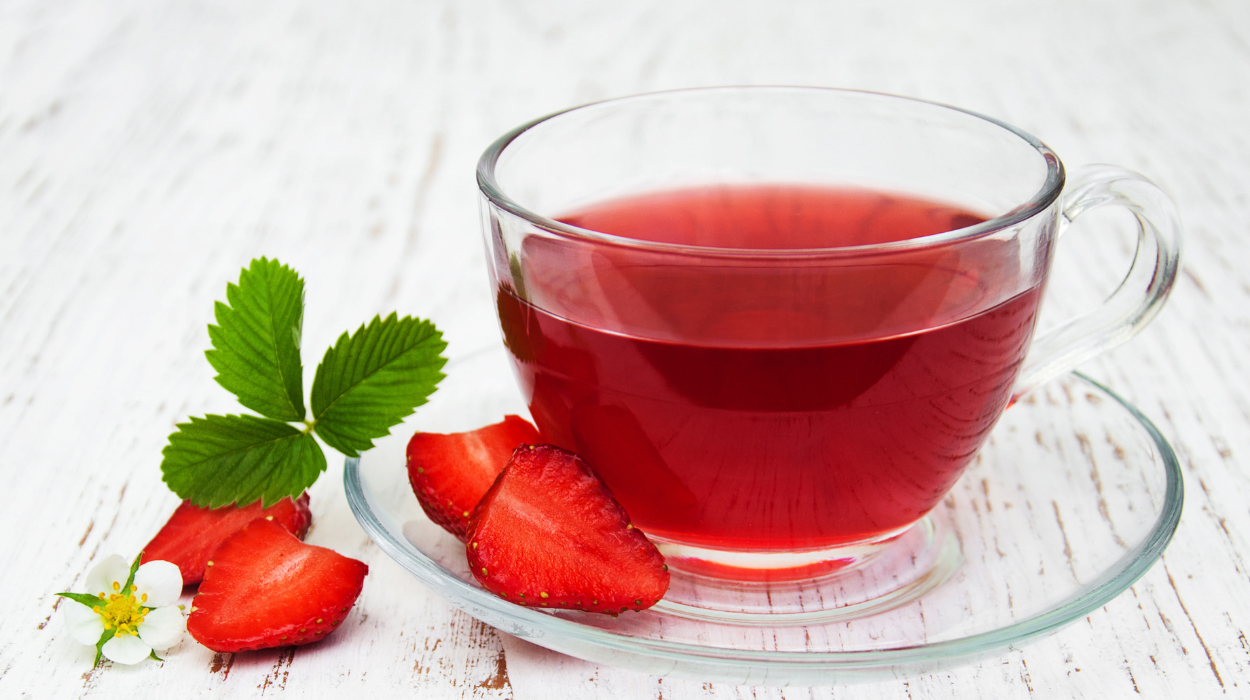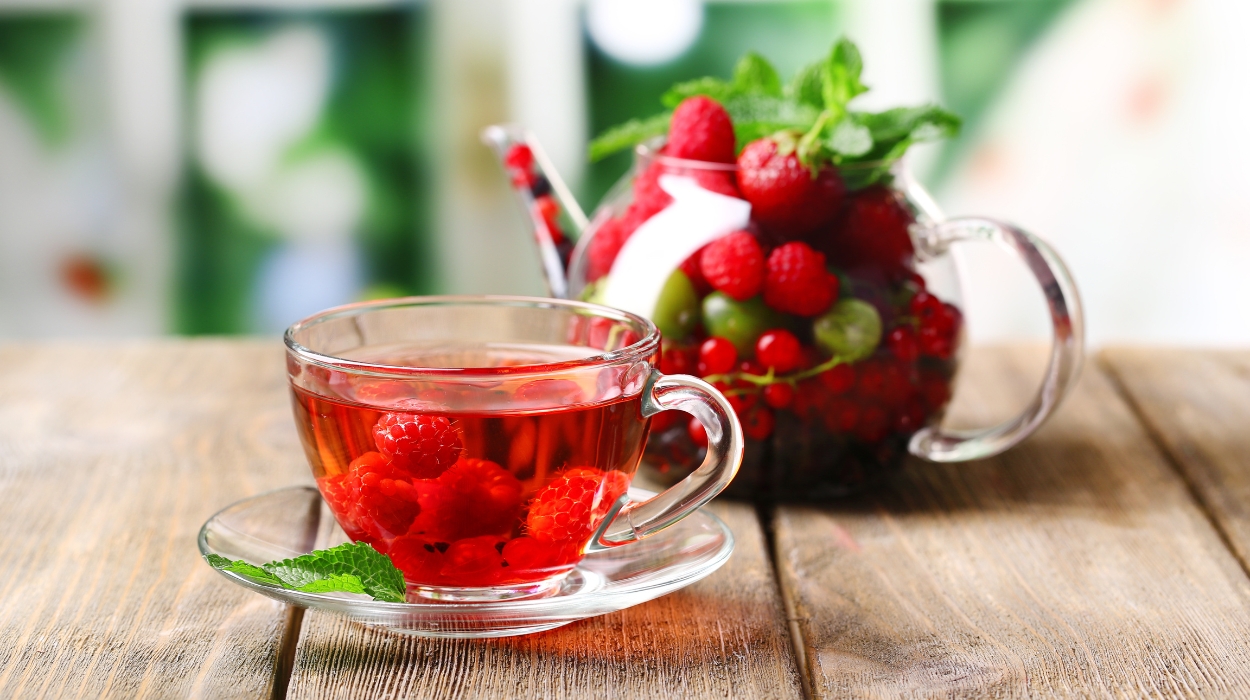Strawberries[1] are a favorite fruit for many people for good reasons. These healthy fruits can be eaten fresh, added to drinks, or baked goods. Apart from eating fresh strawberries, you can enjoy a cup of fresh strawberry leaf tea at home.
There are numerous strawberry tea benefits for health. First, strawberry tea is low-calorie and rich in essential nutrients that benefit body function. Second, drinking strawberry leaf tea is heart-healthy since it helps reduce high blood pressure and LDL cholesterol.[2]
Third, wild strawberry leaf tea is good for bone mineral density. Read on to learn more about strawberry tea benefits.
What Are The Benefits Of Strawberry Tea?
Some of the benefits of drinking strawberry tea benefits include:-
- Low-calorie tea.
- Rich in nutrients, fiber, and antioxidants.
- May boost your immune system.
- May help reduce chronic inflammation.
- May protect the skin from harmful UV rays.
- May help control blood sugar levels.
- May improve heart health.
- May improve bone mineral density.
Benefits Of Strawberry Tea

Low-Calorie Tea
Imagine having tea that can help you achieve your weight loss goals. Apart from green tea or black tea, which are low-calorie and beneficial to your health, you can also try strawberry leaf tea.
Eating strawberries can be refreshing, especially when you make salads in summer. However, another way to enjoy strawberry benefits is by making tea. A cup of refreshing tea is delicious and has fewer calories.
A 100 grams of strawberries only has 32 calories.[3] So, you won’t need to worry about consuming excess calories when you brew a cup of tea from strawberry leaves. You can buy strawberry tea at the store or pick wild strawberry leaves.
Rich In Nutrients, Fiber, And Antioxidants
Many teas are great sources of nutrients The good news is that strawberry leaf tea provides the same benefits. Strawberries and strawberry leaves are rich in essential nutrients. For example, they contain vitamin C,[4] manganese, folic acid, and potassium.
In addition, strawberries are a great source of dietary fiber. Note that 100g of strawberries contain two grams of dietary fiber.[3] Fiber plays an essential role in improving digestion by benefiting the digestive tract.[5]
Lastly, strawberries and their leaves are rich in beneficial antioxidants. Drinking strawberry leaf tea can boost antioxidant compounds such as polyphenols,[6] anthocyanins, and ellagitannins in the body.
May Boost Your Immune System
Drinking strawberry tea helps boost vitamin C levels. Vitamin C is a great way to boost your immunity,[7] so definitely brew a cup today.
Vitamin C enhances white blood cell production[8] thus giving you better protection against diseases. It also helps the white blood cells function properly by protecting them from damage. For example, white blood cell protection from harmful free radicals that invade the body.
May Help Reduce Chronic Inflammation
Evidence shows that berries, including strawberries, are good for your health since they help reduce inflammation. That’s why people suffering from chronic inflammation can benefit from drinking strawberry leaf tea.
Strawberries contain compounds like anthocyanins that have anti-inflammatory properties.[9] Such compounds help guard the body against disease and reduce inflammation.
May Protect The Skin From Harmful UV Rays
If you’ve been researching the benefits of strawberry tea, know that it’s also good for your skin. Strawberries may protect the skin against adverse effects of harmful UV rays.[10] As a result, you experience less damage and can enjoy glowing skin, especially during summer.
May Help Control Blood Sugar Levels
Fruits like strawberries are good for your health. In addition, you can drink strawberry black tea to benefit your body.
Another reason to pop the strawberry tea bags into a pot of hot water is to help regulate blood sugar levels.[11] Strawberry leaf tea benefits include helping control blood sugar levels by reducing glucose digestion, which limits spikes. But, ensure you still take medication and stick to the recommended diet.
May Improve Heart Health
Another strawberry tea leaf benefit worth noting is better heart health.
Research shows that anthocyanins in berries[12] are beneficial to the body in many ways, including reducing the risk of cardiovascular diseases. So, it’s a good idea to have a cup or two of strawberry leaf tea daily. The tea may also help improve HDL cholesterol levels and reduce high blood pressure.
May Improve Bone Mineral Density
The last of the numerous benefits of strawberry leaf tea to consider is that you may experience better bone mineral density.[13] High blood pressure can result in low bone mineral density. Thus strawberry tea may help reduce high blood pressure and protect bone health.
Still, keep taking prescribed medication for health conditions and boost health with strawberry tea.
What Is Strawberry Tea?
Strawberry tea is made using the green leaves of the strawberry plant. It’s possible to find processed strawberry tea ready to brew at the supermarket.
However, you can pick wild leaves and mash them to make fresh strawberry tea at home. Enjoy your cup of strawberry tea hot on a winter day or cool for better refreshment during summer.
Is Strawberry Tea Healthy?
Like green tea and other fresh teas, strawberry tea is an excellent option. Whether you take it hot or cold, there are numerous health benefits to strawberry tea.
Research shows that strawberries are good for heart health and increasing bone density.[14] Plus, you add beneficial nutrients to your diet and won’t need to worry about consuming excess calories.
How Much Should You Drink Strawberry Tea?

There’s no limit to how much strawberry tea you can drink. Having a cup or two every day can ensure your body gets lots of nutrients since strawberries are healthy fruits. Perhaps opt for strawberry tea to alternate with green powder for better health.
How Often Should You Drink Strawberry Tea?
Living healthy requires changing your lifestyle. For example, you can opt to replace sodas with strawberry leaf tea, green tea, or black tea while taking fruit and vegetable supplements.
Enjoy one or two cups a day, and spread throughout the day to enjoy more benefits. Drinking the wild leaves tea every day ensures you get ample nutrients as per your diet.
How To Make Strawberry Tea
Wild strawberry leaf tea is easy to make at home. Boil two cups of water to make the wild leaves strawberry tea. Fetch half a cup of fresh strawberry leaves and a quarter cup of dried leaves.
Place both fresh and dried leaves into the boiling water, reduce the heat, and allow to simmer. Sieve the leaves, and enjoy a cup of hot strawberry leaf tea. If you prefer a cool drink, place ice cubes in a glass and add cool strawberry leaf tea.
Possible Side Effects
There aren’t any adverse effects to drinking strawberry leaf tea. However, you can opt for green tea or black tea if you are allergic to strawberries.
Some people experience some minor side effects such as:
- Constipation.
- Diarrhea.
- Stomach upset.
The side effects tend to disappear after a short duration. However, if symptoms persist, consult a healthcare provider. Consult whether to keep drinking strawberry leaf tea or opt for the best green powders for better health.
The Takeaways
A cup or two of strawberry leaf tea daily is a good idea for numerous reasons. Among the many benefits of wild strawberry leaf tea is that it is a rich source of nutrients, fiber, and antioxidants.
The tea is also good for your heart health, benefits bone density and may help improve immunity. In addition, the tea may help regulate blood sugar levels and is a good option if you have a sugar craving.
It’s easy to prepare strawberry leaf tea since all you need is hot water, fresh wild leaves, and dry ones. Try it out today and get these strawberry benefits.
Frequently Asked Questions
Strawberry tea is good for the stomach and digestive tract since it improves digestion. However, some people experience minor side effects such as upset stomach.
Strawberry tea is good to take at night since it’s a low-calorie drink and can be refreshing. Brew a hot cup or a cool glass, depending on the temperatures outside, before heading to sleep.
Strawberry tea is 100% caffeine-free and an excellent option if you want to avoid caffeine. If you want caffeine, perhaps pick other options, such as green tea or black tea.
Strawberry and raspberry are beneficial teas that are rich in essential nutrients. In addition, you get to enjoy loads of crucial antioxidants that guard against free radicals.
Strawberry tea contains antioxidants that guard your skin from harmful UV rays. So, consuming a cup or two every day is a good idea for better skin health.
 Evidence Based
Evidence Based
